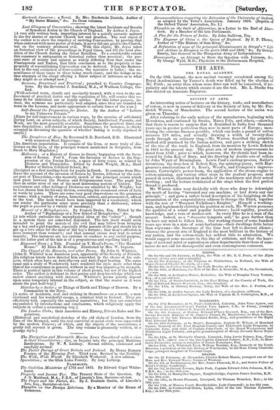SOCIETY OF AETS.
An interesting series of lectures on the history, trade, and manufacture of cotton, is now in course of delivery at the Society of Arts, by Mr. Fre- derick Warren, of Manchester. The second lecture of the series was given on Thursday.
After referring to the early notices of the manufacture, beginning with Herodotus, and continued by Strabo, Marco Polo, and others,—showing that there is reason to suppose that it flourished in India four thousand years ago in greater perfection than now in most parts of Europe ; men- tioning the extreme fineness possible, which can make a pound of cotton measure 219 miles, and actually drawing a width of twenty-four yards through an ordinary ring,—Mr. Warren described the primitive method still practised by the Indian natives, and gave a striking sketch of the rise of the trade in England, from its mention by Lewis Roberts in 1641 to the present day. The great tera of modern improvements he dated from 1760; prior to which, however, the fly-shuttle had been in- vented by John Kay of Bury, and the drawing by double sets of rollers by John Wyatt of Birmingham. Lewis Paul's carding-process, Butler's inventions, the drop-box of Robert Kay, the spinning-jenny, with Har- greaves's ameliorations of it, Itees's, Wood's, and Crompton's improve- ments, Cartwright's power-loom, the application of the steam-engine to cotton-spinning, and various other steps in the gradual progress, next passed in review, illustrated by models of the machinery and their actual working ; and the lecture terminated at the stage when the first perfect thread is produced.
Mr. Warren sides very decidedly with those who deny to Arkvrright the merit of having "invented any one machine, or laid down any one principle " ; and gave a rather broad description of his knighting on the presentation of the congratulatory address to George the Third, together with the rest of "Margaret Nicholson's Knights." Himself a working- man, and legitimately claiming his position as such, Mr. Warren possesses the qualities of a sound and popular lecturer; lucid rapidity, practical knowledge, and a vein of mother-wit. In every fibre he is a man of the present. Indeed, as a " dananator tempoxis acti," he goes further than we have any mind to follow him. Our working classes of some hundred years ago were in a state of semi-barbarism—their dwellings little better than wigwams—the literature of the time best left to discreet silence ; whereas the present men of England is the most brilliant in the history of any nation, and the cotton-trade her noblest title to admiration. We would suggest some measure in this line of criticism, and that the heav- ings of national mind or aspiration in other departments than those of com- merce do not call for disrespectful and even contemptuous comment.


























 Previous page
Previous page